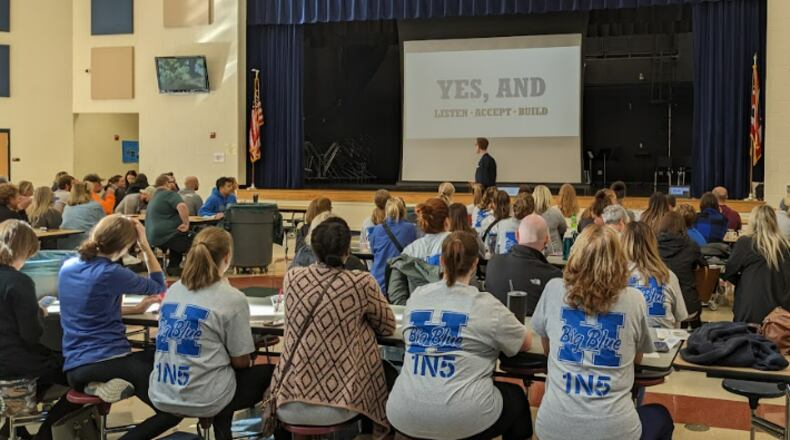That last statistic was why Nancy Eigle-Miller started 1N5, a non-profit serving communities in Greater Cincinnati by increasing awareness and education about mental health in teens and adults. She lost her husband to suicide in 2008, and that took her by surprise. How could a man with a larger-than-life personality die that way?
She took two years to educate herself about mental illness and mental health, “and what was very clear to me is that mental illness starts very early.”
And these next two statistics are why her organization must be in area schools teaching the tools to students, teachers, administrators and parents. By the age of 14, 50% of mental illnesses surface, and that increases to 75% by the time they turn 24. But once a mental illness surfaces, Eigel-Miller said it can take eight to 10 years to get service.
”In my mind, there needed to be education in schools. That was the best place, and that’s where we started,” she said, first partnering with Children’s Hospital and then by 2015 starting education programs in schools.
They have been in Hamilton City Schools since 2018, and it costs the school district nothing due to the grant funding 1N5 receives, according to the school district. Since 2020, 1N5 has received around $65,000 from multiple Hamilton Community Foundation funds.
“We wouldn’t have the ability to do all that training without 1N5 bringing that to us,” said Alexandrea Sorrentino, Hamilton’s supervisor of mental health.
They first brought the CARE for Teachers program to Hamilton Schools in 2018. The following year, they brought more programming, and now the distinct uses the organization even more, especially coming out of the COVID-19 pandemic.
“There’s no way we could have navigated coming back from COVID as well as we did without them bringing in their expertise so that we didn’t have to do the research, find the programs and then make them happen,” Sorrentino said. “They had done the research and gave us a menu of programs, so then we could make it happen.”
Eigel-Miller said the world today “is not very conducive for good mental health for anyone, and I think the pandemic has caused major issues for kids because there was so much isolation. They lost about two years of developmental interactions that didn’t happen.”
“As humans, we need those interactions,” she said. “There are a lot of issues.”
There are shootings, political unrest, gender identity issues, and social media and technology, which are all issues for the youth, and Eigel-Miller said, “All of this is piling up that makes it very difficult for kids to be healthy.”
Last year and this year, 1N5 has worked with Hamilton with its wellness initiatives for the staff, and have helped with the training of ‘Sources of Strength,’ a state-recommended mental health training and curriculum for youth and adults.
Sorrentino said the school district will continue to bring and teach the best practices that are evidence-based as the state legislature regularly adds unfunded requirements.
“They are able to come in and support us, and not just making sure we’re compliant but making sure we’re compliant with the very best programming for our kids,” she said. “They continue to help our staff with the best practices and evidence-based things as well because our staff is with our kids six, seven, sometimes even eight hours a day. We have to make sure they’re at their best so they can teach our kids the very best they can, so we’re not forgetting about them with adding a lot of that programming in.”
Though they’ve been in Hamilton for several years, 1N5 is also providing programming for Lakota and Ross schools, and they’re in conversations with other Butler County school districts. The goal, Eigel-Miller said, is to be in every school district in the tri-state area.
“We haven’t been doing the work that long, but there’s a huge need, especially now,” she said. “The stigma has come down since the pandemic, a lot more people are talking about it, but there’s a lot of issues in this space ― there are not enough practitioners, the time to get service is really long ― and for me, it’s how do you educate ahead of it? How do you prevent things from happening? So you teach people tools about how to stay healthy, you teach parents about what they’re looking for so get kids help earlier and it’s not as serious.”
And Sorrentino said the programming has been positively received among staff and students.
“Our students are advocating for more time and additional resources,” she said, “and we’re looking to partner with 1N5 to provide those things our students are asking for. That is a really positive thing because when kids can ask for what they need, and we can rise to meet what they’re asking for, that’s always a really powerful moment.”
About the Author

